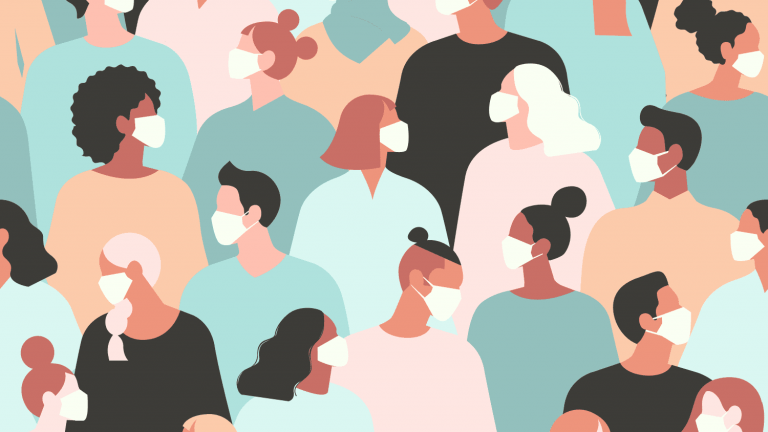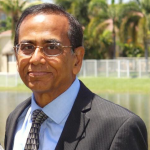
More than a year after the first lockdown, a few more people are wearing masks, a few more seem to be aware of the need to maintain distance, but passing the snack shop I see the jostling crowd again with the varied masking and non-masking.
By Nazarul Islam
As I write this piece today, it happens to be the first anniversary of the death of a friend, and the first among those I lost to Covid-19. He was one of the early ones to fall victim, an outlier, a man in his 60s with no comorbidities, most precautions recommended at that time followed, maybe a slip-up while visiting his local bajaar, maybe something else, maybe a mistake by the doctors still learning how to deal with this thing, maybe carelessness at the nursing home. Suddenly, unbelievably, he was gone.
It felt like a horror story: there’s a rogue, man-eating tiger prowling in the jungle outside the village; if we don’t go there just now, especially at dusk or after dark, we should be fine; and then this man is taken in broad daylight while walking on a path in the middle of the village; who knew the jungle had changed shape and extended its boundaries, who knew the tiger was unpredictable about where and when it struck?
We’ve taken our time trying to understand what is prowling amidst us, devouring us one by one and then in groups and then in droves. We are way past the first anniversaries of the most absurd exhortations ever given by a contemporary leader of a modern nation — Thaali bajao! Diya jalao!
Many of us actually had taken time to stand on our balconies and banged thaalis and vessels; many switched off the lights and lit candles or waved their mobile phone torches. At the same time, hundreds of thousands with no thaalis and no balconies, with no candles or battery lights to waste, trekked across the melting asphalt of the highways in the hottest season of the year, migrating from untenable situations to frighteningly uncertain ones.
Across the last twelve months we’ve had laid out before us in detail the stupidities and criminal manipulations of those in power in the face of this crisis. That ledger will need to be opened and examined again and again; reckonings will need to be demanded; answers, responsibility, blame and consequences will need to be certified and settled. But when I walk out of my building and go on to the road, another question rears its head: leave aside the failed political leaders for a moment, what about us, ourselves?
A year ago, around the time of the first lockdowns, when I used to walk out on the same stretch of road, I observed the following: only about 30 per cent of the people wore masks; of these, many wore them below the nose or took them down to speak and kept them hanging around their necks; almost nobody gave signs of having internalized the idea of physical distancing.
Inside buildings and on the roads, the idea of regularly washing hands or sanitizing them was viewed as a humorous eccentricity. From other cities there were similar reports: the moment a lockdown was eased in other cities where people crowded around shopping areas as if everything was back to normal; in Islamabad people had gathered for religious rituals with redoubled gusto; in Kolkata, it was as if they were on a parallel planet, almost no masks and no lockdown.
From the villages, particularly where my ancestors come from, in Bihar, even after the workers from distant cities reached home, the reports were of bemusement — what is this Covid thing? Answer: it’s obviously a city thing, doesn’t concern us so much.
Back in the city, it felt as though for many people the pandemic was a horror movie playing in the adjacent theatre of the multiplex, nothing to do with the film they themselves were watching except that the sound sometimes leaked through the wall.
People from the privileged classes, that is, the ones with access to the latest information, news and research results, the ones who supposedly had the education to process all this, utterly failed to convey critical points to the less fortunate people who worked for them.
As long as some simulacrum of Covid-19 protocol was being followed in the flat or bungalow, no one cared to inform or educate or help the guards downstairs or the errand boys outside the gate or the stall-wallahs on the footpath. At one point I even heard a corporate-type babu stop someone from talking to a guard: “No need to tell them too much might create unnecessary panic”.
Taking into consideration that the neighboring Indian leaders have infantilized the public, it’s an attitude the wealthier strata replicate when dealing with people lower in the economic order. Or perhaps it is this criminal, feudal ‘bad parenting’ that the political leaders take from the wealthy and inflict upon the masses.
On the streets of Karachi, one of the things you see is working-class people or poorer individuals with the attitude that only the moneyed people can afford to protect themselves and that they themselves are in god’s hands. Taking a rare kaali-peeli taxi ride recently, a friend got talking to the cabbie after he asked the driver to pull his mask up over his nose. The cabbie’s first reaction was, “Don’t worry about me, Babu, whatever happens will happen”.
My friend explained that he was concerned about both of them, and that his mask needed to be up for his safety as well. The driver mentioned god again, saying everything was in His hands. To which my friend replied, “Of course, but god also gives you responsibility.
Otherwise, why don’t you cut your brake wires and steering connection and just press the accelerator?” The driver nodded in understanding. While he may have got it, some of the most powerful people in the country haven’t.
One of the most important social failures over the last 14 months is that people with some knowledge and understanding of this unprecedented, mutating threat have been lax or have abdicated the responsibility of communicating what they know to people who do not have access to or the ability to sift through the barrage of often-contradictory information.
This latter section isn’t only to be found among the lower economic strata; it’s there across all classes, among older people, the more superstitious, the head-in-sand ostriches, the stubborn, devil-may-care types.
More than a year after the first lockdown, when I now walk my stretch of road, a few more people are wearing masks, a few more seem to be aware of the need to maintain distance, but passing the snack shop I see the jostling crowd again with the varied masking and non-masking.
Near the fruit-stall there is that same cretin of a man from last year, tall, strapping, his fancy jogging clothes sodden with sweat, pumping post-run breath on to everyone while holding his mask in his hand. Despite the ongoing carnage in Delhi, Lucknow and the towns and villages of the Gangetic plain, there, in the cluster around the chayer dokaan, everything is as if we were in May 2019.
___________________
About the Author
 The Bengal-born writer Nazarul Islam is a senior educationist based in USA. He writes for Sindh Courier and the newspapers of Bangladesh, India and America. He is author of a recently published book ‘Chasing Hope’ – a compilation of his 119 articles.
The Bengal-born writer Nazarul Islam is a senior educationist based in USA. He writes for Sindh Courier and the newspapers of Bangladesh, India and America. He is author of a recently published book ‘Chasing Hope’ – a compilation of his 119 articles.